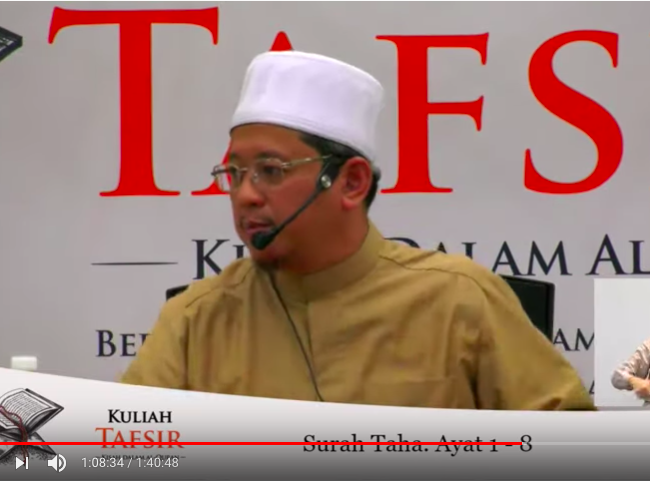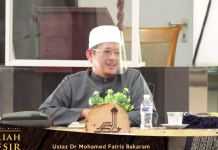This article is a summary of takeaways from Ustaz Dr Mohamed Fatris Bakaram’s Tafsir Lecture at Darul Makmur Mosque on 26th January 2020. It is a continuation of the verses of Surah Maryam. Summaries of the previous lectures on Surah Maryam containing lessons from the lives of Prophet Yahya, Sayidatina Maryam and Prophet Isa AS can be found here.
طه ﴿١﴾ مَا أَنزَلْنَا عَلَيْكَ الْقُرْآنَ لِتَشْقَىٰ ﴿٢﴾ إِلَّا تَذْكِرَةً لِّمَن يَخْشَىٰ ﴿٣﴾ تَنزِيلًا مِّمَّنْ خَلَقَ الْأَرْضَ وَالسَّمَاوَاتِ الْعُلَى ﴿٤﴾ الرَّحْمَـٰنُ عَلَى الْعَرْشِ اسْتَوَىٰ ﴿٥﴾ لَهُ مَا فِي السَّمَاوَاتِ وَمَا فِي الْأَرْضِ وَمَا بَيْنَهُمَا وَمَا تَحْتَ الثَّرَىٰ ﴿٦﴾ وَإِن تَجْهَرْ بِالْقَوْلِ فَإِنَّهُ يَعْلَمُ السِّرَّ وَأَخْفَى ﴿٧﴾ اللَّـهُ لَا إِلَـٰهَ إِلَّا هُوَ ۖ لَهُ الْأَسْمَاءُ الْحُسْنَىٰ ﴿٨﴾
Is Allah Seated on a Throne?
الرَّحْمَٰنُ عَلَى الْعَرْشِ اسْتَوَىٰ
The Most Compassionate, (Who is) seated on the Throne. [20:5]
In the previous lecture, we have touched on verse five of Surah Taha, where we mentioned that we would not go in-depth into the Aqidah issues of this verse. What possible takeaways can we then get from this verse? The interpretation of this verse has been discussed by Tafsir scholars.
The first group of scholars hold the opinion that we should agree that Allah’s being “seated” is not the same as the sitting of His makhluk (creations). We believe that Allah SWT is Perfect. If He SWT says that He Sits on a Throne, then we accept that He Sits on a Throne; We leave the interpretation and meaning behind this phrase to Allah. He is not alike to any of His creations and is free from imperfection. What is important is to understand that Allah is not found in any particular place.
The second opinion, held by many scholars of the Ahlus Sunnah wal Jama’ah, is that this verse is a metaphor. It symbolises Allah SWT as the All-Powerful Authority that Supremely Rules and Reigns over all of creation, in the heavens and the earth, until the Day of Judgement. We do not take it literally but rather accept it figuratively.
The Name ‘Ar-Rahmaan’
In the previous lecture, we went through verse three in which Allah SWT tells us that the Qur’an was sent as a reminder to those who fear Him. We then raised the question of why, out of all of the many Names of Allah, Allah SWT had picked ‘Ar-Rahmaan’ in verse five. ‘Ar-Rahmaan’ is a name that is linked to Love, Mercy, Gentleness and Compassion.
Moreover, Allah SWT is known to have powerful names such as: Al-Qawwiy (the Strong One), Al-Aziz (the Almighty), Al-‘Adl (the Just), Al-Muntaqim (the Avenger), Al-Jabbaar (the Reformer) and Al-Mutakabbir (The Supremely Great). If the Qur’an was sent to people who fear Allah, why did He not use any of these powerful names instead?
The pairing of ‘Ar-Rahmaan’ (the Most Merciful) with ‘yakhsha’ (fear) serves as an evidence against the people who claim that Islam is a faith that only instils fear. The usage of the name “Ar-Rahmaan” emphasises Islam as a religion based on love and compassion.
بِسْمِ اللَّهِ الرَّحْمَٰنِ الرَّحِيمِ
In the name of Allah, Most Gracious, Most Merciful [the Basmalah; Surah al-Fatihah, 1:1]
We are asked to recite Surah al-Fatihah during our prayers, five times a day. The Fatihah is incomplete without the basmalah, in which we mention Allah’s names of “Ar-Rahmaan” and “Ar-Raheem” (Most Gracious, Most Merciful). This verse is followed by us praising the Lord of the worlds. Praise is given only to those who are gentle and kind, not to those who we fear. The third verse in al-Fatihah repeats the two names in the basmalah. We are even taught by the Prophet SAW to begin every action with a basmalah.
So if these two names are the most prevalent in our lives, then how are we expected to fear Allah?
The Fear of Allah
The “fear of Allah” that we speak of in Islam is not a fear that pushes us to run away and distance ourselves from Him. Rather, the fear that we should aim to have, is a fear based upon love for Allah.
Are love and fear opponents of each other? When we speak of ‘fear’, we think of being frightened, uncomfortable and of running away. When we speak of ‘love’, we think about calmness, happiness, wanting to be close to someone and not wanting to be separated from them. However, only a person someone who has truly loved would know this- love has no meaning, if in that love there is no fear. Love is not complete if, in loving someone, there is no sense of fear.
As a father, do you not love your child? Of course you do! Do you have any fear for them? Most definitely. Every loving father fears that their child might live in hardship. You fear that your child may fall into darkness and ignorance without your love. You fear that you may not be able to fulfil the child’s every need. You fear for the child’s poverty, sickness and failure. Most of all, you fear losing the child. True love is love that is unable to be separated from fear.
Even someone who has the love of wealth has fear. He fears that his wealth might be lost. He fears that the wealth that he has worked hard to build may be taken away.
Someone who loves his parents, one of the most honourable of forms of love to have in this world, is also in fear. He fears that his parents may not be pleased with him. He fears that in spite of his efforts to serve them, that they might be angry at him. He fears that despite his love for them, that when they grow old, he might be unable to take care of them to the best of his ability because of any carelessness on his part. He fears that only one of the two parties may enter paradise and that the other may not be able to meet them there.
The love for Allah needs to have fear too- otherwise, it is incomplete and imperfect. What do we fear? We fear that despite of our love for Allah, Allah may not love us back because of our own lacking and weaknesses. We fear losing His Mercy and Pleasure because of our mistakes. We fear being distanced from Him. This is the fear that is spoken of in Verse three of Surah Taha. It is the type of fear that encourages us to remember that Allah SWT is Ar-Rahmaan, the most Gracious.
This is the answer that you can use when people claim that Islam is not a religion of love, that it is a faith founded on fear- a religion of hatred, animosity, wars and battles. What they claim is not true; Islam is made perfect by the fact that we have both raja’ (hope) and khauf (fear) within our love of God.
The Supreme Possessor of All Creation and His Signs
لَهُ مَا فِي السَّمَاوَاتِ وَمَا فِي الْأَرْضِ وَمَا بَيْنَهُمَا وَمَا تَحْتَ الثَّرَىٰ
To Him belongs what is in the heavens, and what is in the earth, and what is between them both, and what is beneath the ground. [20:6]
Allah mentions four spaces here: (1) the skies, (2) the Earth, (3) whatever is between the heavens and the Earth and (4) what is beneath the ground.
As humans, we tend to only notice what is happening above ground- the vegetation, the livestock, our own lives. We do not often think about what is beneath the ground, and yet it is so important to us! The oil and gas that we tap on for power and energy comes from beneath us. The ores of materials and minerals come from beneath the ground. What is beneath us can cause mass destruction and devastation too, in the form of earthquakes and volcanic eruptions. Allah is the Supreme Ruler and Owner of all of that.
Allah is the Sovereign of everything that exists- even the stars and planets in the skies- and He is Ar-Rahmaan. He maintains and sustains all life. Allah can very well choose not to sustain us in this tiny red dot of Singapore. After all, we are so insignificant in the grand scale of all creation. He does not make a loss by not supporting any of us, and yet Allah still provides for us.
Allah SWT maintains the composition of air so that we always have sufficient oxygen to breathe. He supports the clouds in the sky so that we have a continuous supply of shade and water. How often do you see clouds in the sky and anticipate rain, only to realise that rain does not fall? Allah controls the winds that determine where the clouds end up.
Wind is beautiful, we appreciate it. I enjoy listening to the sound of the leaves rustling in the wind. It is as though the leaves are making tasbih to Allah, reminding us of Allah’s Glory. The breeze refreshes us. Back in the days of Kampung life, people would sit under the trees in the late afternoon just to relax and enjoy the wind. This is a ni’mat (blessing) gifted to us by Allah.
A few weeks ago, we heard of the forest fires in Australia. The fires were so extensive that people got ready to evacuate their homes. Hundreds battled to fight day and night to put these fires out and yet they continued to spread. What was the reason for the forest fire’s spread? They were: (1) the heat of the Sun, (2) the dry atmosphere and (3) the wind that blows. Here in Singapore we appreciate and enjoy the breeze, while in other parts of the world, they pray for the wind to stop blowing. Allah is in the One who has full command over the winds.
Do not ever think that reminders from Allah only exist in the Qur’an and that once we close the book and stop reading the Qur’an, we will stop receiving reminders. Anyone with eyes that see and whose hearts are not blind, will be able to observe and identify Allah’s signs all around us. May Allah protect us from being of those who have sight but no not see nor those who have hearing but do not listen to reminders and advice. May Allah fill our hearts with hope and fear of Allah’s Love.
What is Secret and What is even more Hidden
وَإِن تَجْهَرْ بِالْقَوْلِ فَإِنَّهُ يَعْلَمُ السِّرَّ وَأَخْفَى
Whether you speak aloud ˹or not˺, He certainly knows what is secret and what is even more hidden. [20:7]
Allah is addressing both Prophet Muhammad SAW and us, his followers, in this verse. The scholars have discussed this verse, with regard to what the words ‘Sirr’, meaning ‘secret’, and the word ‘Akhfaa’, meaning ‘that which is finer or more subtle’ refers to.
Some scholars hold the opinion that what is ‘secret’ is what is spoken between two people, in the absence of others. That which is ‘more hidden than a secret’ is that which is not even spoken to others, meaning whatever that only we know for ourselves.
The second opinion held by scholars of tafsir is that a secret is that which is not even told to a single person. These scholars hold the opinion that whatever has been spoken is no longer a secret- it rarely remains between two parties. What is ‘more hidden than a secret’, on the other hand, is that which we keep to ourselves and that we ourselves even forget it or do not notice it.
For example, there are times when we see someone or something and certain thoughts flicker across our mind. We say things like, “If only I had that much time/money, I would do so much good with it!”. Then life goes on and we forget these thoughts even existed. Only decades later, would we suddenly remember once having such a thought a long time ago. We are humans, it is normal for us to forget.
We also have the concept of ‘déjà vu’, it refers to the familiar feeling of having been somewhere in a similar situation previously. There are things which we have one thought of, dreamt or and desired for, which then are forgotten and only after a while are we reminded of them. AllahAllah knows all of this. Whether or not something is said aloud, in secret, kept in our hearts or even forgotten, Allah knows all of it. On the other hand, a human ruler would never be able to have full knowledge and authority over all things.
A king delegates to his advisors and community leaders and they manage what is below them. The king only receives reports from the heads, he does not know the details of every person in His community. Likewise, even working in MUIS, I do not know everything that is happening in all of the mosques of Singapore. Work is delegated to the various mosque leaders. Allah is unlike us; He has full knowledge of every little thing that flashes through your mind. He does not miss a single detail.
The Names of Allah
اللَّـهُ لَا إِلَـٰهَ إِلَّا هُوَ ۖ لَهُ الْأَسْمَاءُ الْحُسْنَىٰ
Allah -there is no god except He. To Him belong The Best Names. [20:8]
This verse is a reminder for us to take notice of Allah’s names. These are the names that Allah has picked for Himself. They tell us about who He is, and how Perfect His Qualities are. Allah owns everything in the heavens and the Earth. His Reach is Complete and Limitless. Similarly, so is His Power and Authority. From these names, we learn that Allah is the most Expansive, the most Gentle, the most Kind, the most Stern, the most Loving, the most Firm, the most Generous, the most Forgiving, the most Avenging and the most Just. These are just a few of the attributes through which Allah has introduced Himself to us, His servants, through the Qur’an.
A Solution to Every Trial
Here is a piece of advice: Whenever you are in a difficult situation, regardless of how big the test is and how difficult your circumstances are, recite these eight verses of Surah Taha. Understand their meaning and reflect upon them. Surely, for as long as you hold onto these, you will never lose yourself and your beliefs. Regardless of how difficult and impossible your trials may seem, you will always find a way out.
If you find that you are being constrained by financial difficulties, facing unemployment or being worried about how to feed your children- remember that Allah is Ar-Razaaq. It is He who gives Sustenance. He is al-Waasi’, the most Expansive and who can give you relief from the tightness you are encountering.
If you find it too difficult to live life, because the world is just filled with so much injustice and no matter how hard you try, you always seem to be treated unfairly- then remember the name of Al-‘Adl, the Most Just. If someone does any injustice to you and you see them get away with not having to take responsibility for their actions, do not worry. Call upon Al-Muntaqim, the Avenger. Al-Jabbaar, the Compeller, and Al-‘Aziz, the Mighty, can punish all evil deeds.
If you are craving for love and affection, call upon Al-Lateef, the Gentlest and Kindest. If you feel lonely, seeing your companions getting married and finding yourself still single and alone, call upon Al-Jaami’, the One who Assembles and Unites. Only He can reconcile hearts that have been separated and mend broken ties.
Regardless your situation, Allah is able to provide solutions to all problems. So seek Allah for help.
قُلِ ادْعُوا اللَّهَ أَوِ ادْعُوا الرَّحْمَٰنَ أَيًّا مَّا تَدْعُوا فَلَهُ الْأَسْمَاءُ الْحُسْنَىٰ وَلَا تَجْهَرْ بِصَلَاتِكَ وَلَا تُخَافِتْ بِهَا وَابْتَغِ بَيْنَ ذَٰلِكَ سَبِيلًا
Say: Call upon Allah or call upon Ar-Rahmaan; whichever you call upon, He has the Best Names; and do not utter your prayer with a very raised voice nor be silent with regard to it, and seek a way between these. [Surah Al-Isra’, 17:110]
Allah is As-Samii’, the All-Hearing. He is Al-Baseer, the All-Observing. He Hears and Sees all things. There is no need to strain your voice when making du’a to Him- He Hears you anyway.
Do not go into the other extreme either, whispering your prayers so softly because of shame and humility, that your du’as are barely audible. Prophet Muhammad SAW used to make prayers aloud, in a voice that was audible enough to be heard by his companions. This was why we know of du’a compilations today of the du’as that Rasulullah SAW used to recite.
When you reflect upon Allah’s Beautiful Names and realise the true Power that He Holds, you will realise your own weaknesses and how much you need His Help, Protection and Guidance in all that you do. Turn then to Him. Call upon Allah SWT by His Names with a heart full of hope and fear of His Love and Mercy.
May Allah make us amongst the believers who are always calling upon Him, whose hearts are filled with hope and fear of Him and whose only wish in this world is for His Pleasure and His Love for us.
Ameen.
Summary by: Arina Adom
Arina Adom is a lover of learning who takes on the world with an open mind. Resourceful and adaptable, always ready to take on new challenges. Comfortable working with diverse groups of people, yet able to work independently. Thrives under pressure. Currently seeking a meaningful career that enables me to impact lives directly and bring about positive changes in the lives of others in the community.
Arina graduated with a degree in Science ( Hons ), Life Science from NUS and is currently a Research Assistant at Evolutionary Biology Lab ( NUS ). She is currently taking a diploma in Quran and Sunnah Studies from Al Zuhri.
Watch Mufti’s Kuliah Tafsir again at
MUSLIM SG Youtube
Watch and follow MUFTI classes weekly
every Sunday after solat Maghrib
organised Masjid Darul Makmur & Muslim.SG.
Your contributions are appreciated.Get more details by clicking the image below.











